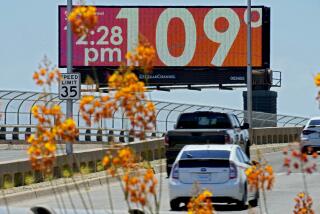Some Light Through the Tunnel
- Share via
There’s a lot of depression about the Asian recession. Take, for instance, pessimist-in-chief George Soros, the billionaire hedge fund and currency operator. The world faces nothing less than a deep and prolonged global downturn, he writes in his new book “The Crisis of Global Capitalism,” and no one in authority has figured how to contain the contagion that will eventually undermine even China. President Clinton also believes that the global economic system is in trouble. He told an audience in South Korea last week that “the situation [in Korea today] is worse than it would have been because of the volatility and size of the [worldwide] financial crisis.” Treasury Secretary Robert Rubin is said by aides to be privately “very dark” about world economic prospects.
Is there no hope? There is, according to Rubin’s own assistant, Lawrence Summers. Summers, the deputy U.S. Treasury secretary and former Harvard and MIT economics professor, is not sold on the pessimist line. Though far from a Pollyanna-ish optimist, he is hoping that the worst of the Asian economic crisis may well be behind us. As if in agreement, the Asian Development Bank last week forecast that no fewer than 23 countries (excluding Japan) would show positive growth in the region next year. Summers’ positivism and the ADB’s prognostication may be the best news for Asia since Congress authorized more money for the International Monetary Fund bailout.
But does Summers really see light at the end of the tunnel or is he just hallucinating? “There’s not just more tunnel at the end of the tunnel,” Summers told me last week. “You know that’s the case when, for the first time, the forecasts prove to be too pessimistic.” South Korea and Thailand, for instance, seem to be getting their economies under control more quickly than anyone predicted. Summers is bullish about Asia, however, only when the region’s governments are not bearish about reform. “You know,” he said, reaching for humor, “it may just be that some of the recommended economic remedies work better when followed than when ignored.”
Summers is no free-market fundamentalist--to use Soros’ phrase--who believes that economies can always govern themselves. “We must recognize that the so-called invisible hand requires a strong government skeleton behind it,” he said. He thus remains negative about Tokyo, whose government often seems more threadbare skeletal than strong: “The Japanese have a long way to go. They keep trying to do more of the right things, including fiscal expansion and banking reform, but action has come slowly, and the problem has gotten worse.”
Summers certainly has his critics in America and in Asia. He is, for instance, often viewed as a triumphalist--trumpeting the American way for every economic challenge. Indeed, for all the world’s economic problems, he says: “I don’t think the capitalist model has been discredited.” In fact, he insists, Asia would be in less trouble now had its markets originally been more open to outside competition and independent monitoring. But when governments intervene heavily in their economies, they must be sensitive to the risk of using the few crude tools at their disposal in a way that makes their problems worse. Malaysia, which abruptly erected capital controls, comes to mind: “Undiluted markets may work best,” he warns, “but partially distorted markets may work worst. Most sudden reforms are not always the best.”
In his book, Soros, who’s far more the pessimist, writes that perceptions as much as realities determine our economic future. With that, Summers could not agree more. The main obstacle to Asia’s full recovery, he believes, is the failure of Western private investment to return to Asia in full force. Summers reflects the emerging Western consensus that Asian economies need to be massively stimulated, as, in fact, China’s leaders, those closet Keynesians, are now doing: “It is the irony of the financial crisis that it was caused by too much lending but it will be solved by a lot more lending,” Summers said. “If our response to the crisis causes less money to flow, it’s a problem.”
Summers worries that investors who were burned in Asia will be reluctant to return. The international community must help ease investor fears, he said: “There should and will be a global effort to develop stronger banking supervisory standards to control capital flows. Banks that are too large to fail are too large not to regulate closely.”
Western investors mustn’t lose their common sense and treat Asia as if it were radioactive. Pessimism, that self-fulfilling prophecy, is the enemy of success. How can there be any light at the end of the tunnel if all anyone ever sees is darkness?
More to Read
Sign up for Essential California
The most important California stories and recommendations in your inbox every morning.
You may occasionally receive promotional content from the Los Angeles Times.













